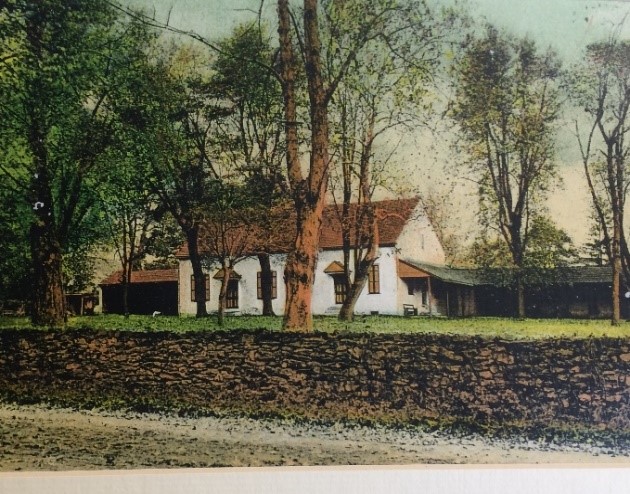There will be a short program from 11:00–11:30 a.m., followed by a Treasure Map Tour and a garden lunch. Rain means the inside garden! Everyone will receive a “treasure map” to use to visit different displays throughout the meetinghouse and grounds. Highlights include our Underground Railroad “station,” the work we are doing to mitigate the effects of climate change, and our ongoing efforts to promote peace and racial justice.
Land Acknowledgement
Plymouth Monthly Meeting’s Right Relationship with Indigenous Peoples Minute and Queries
In 2023 our Monthly Meeting established a working group to begin the process of writing a Land Acknowledgement. From the beginning, we knew we did not want to create a few paragraphs of words that would be read at the beginning of Meetings and then quickly forgotten. Quakers have never been much for the rote reciting of words. Our statements of concern come from the transformed heart. Therefore, to do this we have spent time reading our history with indigenous peoples and taking opportunities with those indigenous peoples who reside in Lanapehoking (the Delaware Valley) and also farther afield.
Our working group agrees that there should be a minute that records our affirmation of the people whose land we live on, and that there have been steps and missteps in our relationship with them that have caused them much pain and suffering. In addition, this minute needs to affirm our desire to learn from them and to support Indigenous people’s initiatives and challenges.
To achieve these goals, our Monthly Meeting approved the minute to follow, along with queries. We have set the Tenth Month of each year to review the queries, with reflection on what has occurred in the prior year and what is rising as a concern to engage in the coming year. The intent of the working group is to have our consideration be a live and dynamic, prayerful consideration each year by the members and attenders of our Monthly Meeting, thereby replacing the rote, mindless reading of Land Acknowledgment words. Instead, it is hoped that fresh, prayerful consideration of the queries will continually open our community to new ways of relationship and to learning along with our indigenous neighbors.
Plymouth Monthly Meeting
Right Relationship with Indigenous Peoples Minute and Queries
Approved June 16, 2024
The land occupied by Plymouth Monthly Meeting of the Religious Society of Friends
(Quakers) is located in Lenapehoking (the Delaware Valley of Pennsylvania). It is on the hill east of the Manaiunck (Schuylkill) River, above Conshohocken, one mile west of the former Lenape village of Lokanahunshi (“Elm tree”), along the Wissahickon Creek.
The homeland of the Lenape people has been along the rivers and streams of
Lenapehoking for over ten thousand years. Due to colonization, slavery, genocide, and
forced removal, many Lenape were forced to reservation lands in Canada, Wisconsin,
and Oklahoma. Others who remain in Lenapehoking are our neighbors and continue to maintain their identity. Other Indigenous peoples have made their home in
Lenapehoking through past centuries and today.
As Friends, we are inheritors of our prior generations’ steps and missteps in their relationship with the Lenape and other Indigenous peoples.
We commit ourselves to prayerfully consider the following queries:
1. How are we seeking to understand the role that prior generations of Quakers
played in displacing Lenape peoples from Lenapehoking and in participating in
programs of cultural erasure (such as Boarding Schools)?
2. How are we seeking to renounce those Christian Church ideologies that
legitimized colonization, genocide, and cultural erasure of Indigenous peoples in
Lenapehoking and elsewhere (such as the Doctrine of Discovery)?
3. In what ways do we seek opportunities to meet Lenape peoples and to learn
directly from them about their history, culture, and current concerns?
4. In what practical ways (monetary or other) have we supported Lenape or other
Indigenous peoples in their initiatives and challenges?
5. In what ways have we embraced Lenape perspectives and knowledge of the
land, water, and air in the stewardship of the land where our Meeting house is
located?

